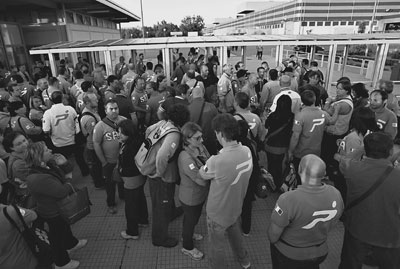As I write, on the threshold of autumn, it is difficult to imagine how the Italian political situation will evolve in the coming weeks. What seems clear to me is that not much will change. It was paralyzed by a sum of powerlessness that crystallize the political landscape-business-mobster who is under everybody's eyes.
The terror that prevails is that a call to the polls can subvert the Italian system.
Berlusconi knows that, if he loses the giantic power, which he acquired in the last election, an overwhelming majority in the House and the Senate, not only his opponents but also his friends/employees would cut him in pieces. The collapse of the apparatus that was created to defend its interests and that feeds the survival of its court of miracles, makes exile the only choice, the path already traveled by his companion of the past, Craxi.
The opposition (or presumed) is unwatchable. They cannot even be a credible core of players who will sit around a table to draw, not sto ay a long-term strategy, but not even a tactical emergency that makes them presentable to any electorate. The only thing that is perfectly able to demonstrate to a bewildered public opinion is the internal conflict that corrodes them.
 |
Pomigliano d’Arco (Na) – operai Fiat in attesa
di fronte al cancello d’ingresso della fabbrica |
 Marchionne and the new bourgeoisie
Marchionne and the new bourgeoisie
Then there is the frontal attack on workers' rights, won with great sacrifice at the end of the sixties of last century with the metalworkers' collective agreement and culminated in 1971 with the Workers' Statute.
Marchionne has been clear about this. The battle that has contracted on behalf of Fiat, but also for the benefit of the whole industrial apparatus, not only in Italy, repeats the pattern of the pre-modern as a place of forced labor, where the master is the absolute arbiter of the life of its own employees , which denies any rights. Blackmail is the hijacking of their investments in alternative more inviting areas.
For a challenge of this magnitude, the struggle for the defense of one job does not pay. Government and trade unions, except for niche resistance insignificant in relation to the size of the issues at stake, sided with the company, as they have done for the Fiat plant in Pomigliano, and the worker will once again be lonely, without protection.
At this point the use of ghosts of the past such as the class struggle is a barking at the moon and an alibi to justify impotence.
The class is gone. Just in the way Marx had theorized at the time of the first industrial revolution, it was overwhelmed by the end of the second Fordist revolution and has definitely lost its connotations with the computerization of production processes and the advent of frontier technologies.
At this stage, the protagonist is a new middle class prepared to deal with minor and major problems of the capitalist economy. That category of employees in the manufacturing industry which contributes to the enhancement of capital (Marx) and that, in his theorizing, is the only one significant opposition to capitalism (peasants, artisans, small traders, etc.. Constituted an underclass of workers in tow 'industry), well this class has missed the rendezvous with history, and in the second millennium is to be expelled from the cycles of the new capitalist production.
Our task as anarchists would be to rebuild a strategy of revolution that will unite all free men, irrespective of the roles that the logic of domination has traditionally allotted to them. Thus pursuing the path marked out by our instructors who have always opposed any form of discrimination between men and have always fought for a society of free and equal. A large table to review the forms of struggle that we affranchino of reformism, freeing us from stale formulas that have led us nowhere and will allow us to aggregate all the men who already intend to take, even unconsciously, the way to a libertarian life.

